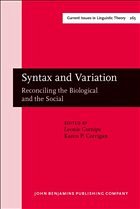Main description:
The papers in this collection share a common interest in the empirical, theoretical and meta-theoretical aspects of the 'internal-external' ('formal-functional') debate in linguistic theory. The primary aim of this volume is to initiate cooperation between internationally renowned generative and variationist linguists with a view to developing an innovative and more cohesive approach to syntactic variation. The present volume contains treatments incorporating the analysis of external factors into accounts focusing on the internal linguistic conditioning of syntactic variation and change cross-linguistically. As such, it offers novel approaches to three key areas of current linguistic debate, viz. Methodological practices, Theoretical applications and Modularity. The volume is, therefore, an important achievement for the progress of linguistic theory more generally and it is an even more crucial milestone in the coming-of-age of 'Socio-Syntax' as a discipline in its own right.
Table of contents:
- Toward an integrated approach to syntactic variation
- Part 1: Aspects of modularity
- A modular approach to sociolinguistic variation in syntax
- Selective optionality in language development
- Syntactic variation and spoken language
- Part 2: Individual speaker variability and methodological innovation
- Idiolectal variation and syntactic theory
- Focus raising
- Part 3: Syntactic variability, social stratification and real/apparent time
- Variation and the minimalist program
- Principles and parameters in change
- Morphosyntactic variation and theory
- Part 4: Syntactic variability across geographical space
- Word order variation in three-verb clusters and the division of labour between generative linguistics and sociolinguistics
- The third dimension of person features
- Index
The papers in this collection share a common interest in the empirical, theoretical and meta-theoretical aspects of the 'internal-external' ('formal-functional') debate in linguistic theory. The primary aim of this volume is to initiate cooperation between internationally renowned generative and variationist linguists with a view to developing an innovative and more cohesive approach to syntactic variation. The present volume contains treatments incorporating the analysis of external factors into accounts focusing on the internal linguistic conditioning of syntactic variation and change cross-linguistically. As such, it offers novel approaches to three key areas of current linguistic debate, viz. Methodological practices, Theoretical applications and Modularity. The volume is, therefore, an important achievement for the progress of linguistic theory more generally and it is an even more crucial milestone in the coming-of-age of 'Socio-Syntax' as a discipline in its own right.
Table of contents:
- Toward an integrated approach to syntactic variation
- Part 1: Aspects of modularity
- A modular approach to sociolinguistic variation in syntax
- Selective optionality in language development
- Syntactic variation and spoken language
- Part 2: Individual speaker variability and methodological innovation
- Idiolectal variation and syntactic theory
- Focus raising
- Part 3: Syntactic variability, social stratification and real/apparent time
- Variation and the minimalist program
- Principles and parameters in change
- Morphosyntactic variation and theory
- Part 4: Syntactic variability across geographical space
- Word order variation in three-verb clusters and the division of labour between generative linguistics and sociolinguistics
- The third dimension of person features
- Index

